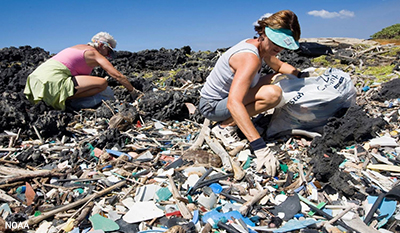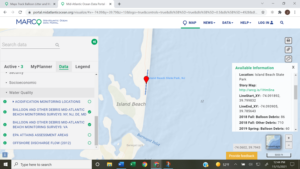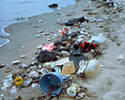WORK GROUPS & COLLABORATIVE EFFORTS
Marine Debris Work Group
Addressing the problem of marine debris requires collaboration across multiple levels of government, with partners in the private sector, and with members of the public. MARCO supports regional coordination on marine debris through the Marine Debris Work Group and related activities.

2025 Microplastics Webinar Series
In this four-part webinar series, we’ll explore the impact of microplastics and microfibers on coastal and ocean resources in the Mid-Atlantic region. Leading researchers and policy experts will discuss key concerns, research gaps, and emerging solutions to this growing challenge. These sessions aim to share the latest scientific findings, spark conversations, and identify actionable steps for regional stakeholders.
SCHEDULE & SPEAKERS
Recorded sessions will be available after events. Dates and speakers for later webinars TBA.
May TBD: Microplastics’ Impact on Marine Species and Habitat
Speakers will explain microplastic quantification methods, trace their environmental pathways, and explore their impact on freshwater and marine ecosystems. The webinar will focus on top research priorities, standardization of methods, and the vulnerability of habitats to microplastic-related threats.
August TBD: Microplastics Origins and Extended Producer Responsibility
Examine regional and federal policies addressing marine microplastics and plastic waste and their terrestrial origins. The webinar will highlight case studies of regional advocacy efforts and explore Extended Producer Responsibility (EPR) schemes. It will explore how to engage businesses in plastic waste reduction and prevention, discuss policy actions aimed at mitigating microplastics, and identify actionable steps for stakeholder implementation.
RECORDING: March 28: How Microplastics Transfer Through the Marine Food Chain
This webinar discussed the way in which microplastics transfer through the marine food chain, using current research, models, and case studies. The webinar reviewed findings from the Chesapeake Bay and Atlantic Ocean, highlighted ongoing initiatives, and identified opportunities for collaboration. CLICK HERE for recording.
RECORDING | Jan. 27: Microfibers: Current Research, Actions, and Data Gaps
This webinar provided an overview of current research on the impacts of microfibers on marine resources, assessed key knowledge and data gaps, and identified areas for further investigation. The webinar showcased ongoing research, mitigation efforts, and explore actionable next steps for advancing research, policy, and collaboration. CLICK HERE for video and details..
Balloon Release Reduction and Prevention Campaigns
In 2017 the Work Group convened for a Mid-Atlantic Regional Marine Debris Reduction Workshop to develop options for a regional strategy to discuss potential regional projects and collaborations.
In 2018 MARCO received an FY18 NOAA Marine Debris Prevention Grant to complete a project to expand on Virginia CZM’s community based social marketing campaign to reduce mass balloon releases at celebratory events.
In 2021 the Work Group launched the Prevent Balloon Litter Campaign with a website, public awareness campaign and a story map.
Balloon marine debris is of immediate concern to the Atlantic Coast because of its potential deadly effects on marine wildlife through ingestion and entanglement. Balloons are unique among all the man-made litter because helium-filled balloons (and their attachments including plastic valves, disks and ribbons) are a form of litter that people actually purchase with the intent to release them into the environment.
Tracking Balloon Litter and Marine Debris

Three map layers on the Mid-Atlantic Ocean Data Portal provide a snapshot of the prevalence of balloon litter among the many types of marine debris found on beaches throughout the Mid-Atlantic. The maps mark six locations throughout the region where MARCO initiated recurring beach cleanups beginning in 2016 and recorded how many pieces of balloon litter and other plastic trash were recovered.
Mid-Atlantic Marine Debris Summit

In 2019 Virginia CZM hosted a Mid-Atlantic Marine Debris Summit which the Work Group helped to organize. Presentations from the 2019 Summit can be viewed here.
On July 20 – 22, 2021, the Mid-Atlantic Marine Debris Summit brought together policy-makers, researchers, businesses and the public to explore current trends in marine debris, new science on marine debris impacts, and new technology, policies and initiatives to prevent and reduce marine debris. Watch the recordings of the 2021 Summit sessions. Summit Agenda Summary Report
Regional Marine Debris Collaborative
With assistance from NOAA, the Mid-Atlantic Regional Marine Debris Work Group developed a Regional Marine Debris Collaborative Portal to spatially and visually track the marine debris projects both past and present in the Mid-Atlantic. The tool uses an interactive map and table to highlight the many efforts in the region to reduce marine debris, including information such as funding amount, project details, and locations of proposed, ongoing, and completed projects.
For more information about the Marine Debris Work Group contact info@midatlanticocean.org.
